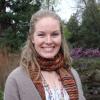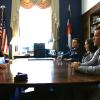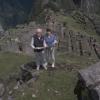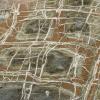Clint Talbott
 On May 16, alumnus Henry Prescott will begin a 43-day, transcontinental cross-country bicycle ride that will start in Seattle and end in Portland, Conn. His aim is to raise money to support people living with Parkinson’s Disease, and the fund-raising ride he created is called Cycle Sea to Sea for PD. Pretty good for a guy who doesn’t think of himself as a cyclist.
On May 16, alumnus Henry Prescott will begin a 43-day, transcontinental cross-country bicycle ride that will start in Seattle and end in Portland, Conn. His aim is to raise money to support people living with Parkinson’s Disease, and the fund-raising ride he created is called Cycle Sea to Sea for PD. Pretty good for a guy who doesn’t think of himself as a cyclist. Melanie Sarah Adams had a hunch: Maybe today’s conventional agricultural practices not only degrade the Earth’s environment and threaten future food security but also produce nutritionally imbalanced foods that harm human health.
Melanie Sarah Adams had a hunch: Maybe today’s conventional agricultural practices not only degrade the Earth’s environment and threaten future food security but also produce nutritionally imbalanced foods that harm human health. What if the Soviet Union had won the race to place a man on the moon? The answer, in the form of a class assignment, is one way a CU-Boulder instructor is working to teach students how to communicate science more effectively and even artfully. The bonus: the what-if assignment ties into the chancellor’s Grand Challenge on space.
What if the Soviet Union had won the race to place a man on the moon? The answer, in the form of a class assignment, is one way a CU-Boulder instructor is working to teach students how to communicate science more effectively and even artfully. The bonus: the what-if assignment ties into the chancellor’s Grand Challenge on space. The University of Colorado Boulder has appointed Brian Domitrovic as the Visiting Scholar in Conservative Thought and Policy for the 2015-16 academic year. He is the third person to be appointed to the position. He hopes to address vexing problems in economic thought.
The University of Colorado Boulder has appointed Brian Domitrovic as the Visiting Scholar in Conservative Thought and Policy for the 2015-16 academic year. He is the third person to be appointed to the position. He hopes to address vexing problems in economic thought. Before coming to CU, Courtnie Paschall had graduated from the Naval Academy, attained the rank of lieutenant and undergone years of flight training. Now, she’s graduating summa cum laude with a degree in neuroscience and a minor in electrical engineering. She is also the Outstanding Graduate for the College of Arts and Sciences for spring 2015.
Before coming to CU, Courtnie Paschall had graduated from the Naval Academy, attained the rank of lieutenant and undergone years of flight training. Now, she’s graduating summa cum laude with a degree in neuroscience and a minor in electrical engineering. She is also the Outstanding Graduate for the College of Arts and Sciences for spring 2015. The CU in D.C. Program gives students the chance to live, study and work in the capital, and while it attracts political science majors, it’s open to all majors, and internships run the gamut from the humanities, sciences, nonprofits to government service. Just ask these students.
The CU in D.C. Program gives students the chance to live, study and work in the capital, and while it attracts political science majors, it’s open to all majors, and internships run the gamut from the humanities, sciences, nonprofits to government service. Just ask these students. Most people who see something curious during world travels might briefly muse about it, perhaps weave it into a cocktail-party anecdote, but otherwise let it go. But most people are not like Ruth Wright or her husband, Ken. In 1974, she wondered about water stains on rocks at Machu Picchu. This led to four decades of study of the Inca engineering and culture.
Most people who see something curious during world travels might briefly muse about it, perhaps weave it into a cocktail-party anecdote, but otherwise let it go. But most people are not like Ruth Wright or her husband, Ken. In 1974, she wondered about water stains on rocks at Machu Picchu. This led to four decades of study of the Inca engineering and culture. During the evolution of invertebrates like amphioxus into vertebrates like fish, a remarkable structure appeared: the head. How, exactly, the head evolved has long been a mystery, but scientists postulated that skulls were built from fundamentally new tissue. Now, CU-Boulder research suggests that skull tissue was actually built from existing tissues never before found in invertebrates.
During the evolution of invertebrates like amphioxus into vertebrates like fish, a remarkable structure appeared: the head. How, exactly, the head evolved has long been a mystery, but scientists postulated that skulls were built from fundamentally new tissue. Now, CU-Boulder research suggests that skull tissue was actually built from existing tissues never before found in invertebrates. CU-Boulder’s David Shneer is known for his historical research on photojournalists who chronicled the Holocaust in World War II Soviet Union; they witnessed and recorded the slaughter of Soviet citizens including those who, like the photographers themselves, were Jewish. Now, Shneer is curating an exhibition of the photographs in Illinois that appears in English and, for the first time, Russian. Soviet Holocaust survivors and Soviet WWII veterans have responded favorably.
CU-Boulder’s David Shneer is known for his historical research on photojournalists who chronicled the Holocaust in World War II Soviet Union; they witnessed and recorded the slaughter of Soviet citizens including those who, like the photographers themselves, were Jewish. Now, Shneer is curating an exhibition of the photographs in Illinois that appears in English and, for the first time, Russian. Soviet Holocaust survivors and Soviet WWII veterans have responded favorably. Alexis Templeton, associate professor of geological sciences at the University of Colorado Boulder, leads a team of scientists who recently landed a $7 million, five-year grant from NASA to study “rock-powered life.”
Alexis Templeton, associate professor of geological sciences at the University of Colorado Boulder, leads a team of scientists who recently landed a $7 million, five-year grant from NASA to study “rock-powered life.”

